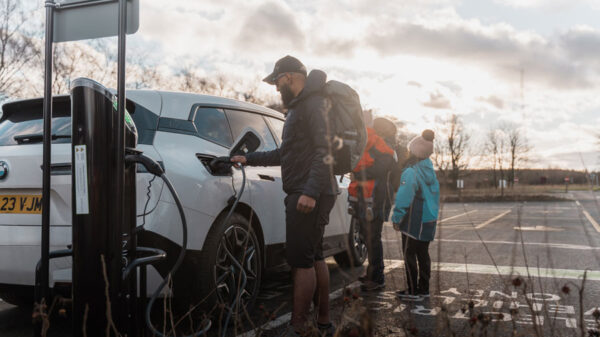West Yorkshire Fire and Rescue Service (WYFRS) joined forces with Yorkshire Water to give a safety message at Warley Moor Reservoir (Halifax Sailing Club).
Although we have had scorching days in June on the day the weather did turn to rain, but firefighters were not deterred from carrying out their water rescue exercise, in their protective gear and life-jackets.
The exercise was designed to show a mock-up water rescue in support of the national Drowning Prevention Week run by the Royal Life Saving Society UK (RLSS UK).
West Yorkshire Fire and Rescue Service has been called to 32 water rescue incidents across the region in 2016/17 – this in all types of open waterways.
Sadly four resulted in fatalities, 13 people were rescued with injuries and the rest were rescued without injury.
WYFRS’s Martyn Greenwood said on the day: “Despite the inclement weather today we really hope that our water safety messages will get across to the public, especially in light of the recent heatwave we have experienced.
“The Fire Service does not just put out fires. We are trained and equipped to carry out water rescues too. It’s very tempting in hot weather to enter the water to cool off but you can very easily get into difficulty as cold water shock takes control of the body. Please do take care if you are out and about over the Summer months near open water.”
In the UK, around 400 people die from drowning as a result of an accident in or around water.
Nationally, the emergency services respond to over 100,000 water-related rescues, and flood events every year.
Darren Lynch, Regional Raw Water Manager at Yorkshire Water said: “Even though the weather’s taken a turn for the worse today, we still want to highlight the dangers of swimming in reservoirs. They may look tempting to take a swim in but they can be killers and today’s practice rescue will hopefully raise awareness of these risks amongst young people. Cold water shock can lead to hyperventilation, increased blood pressure, breathing difficulties and heart attacks plus water temperatures remain just as cold in summer as in winter.”
We are promoting the ‘FLOAT TO LIVE’ summer safety message from the Royal National Life Saving Institute (RNLI).
With the launch of their hard-hitting video, they deliver advice on how to react should you become stricken in cold water.
Everyone who falls unexpectedly into cold water wants to follow the same instinct, to swim hard and to fight the cold water. But when people fight it, chances are, they lose.
Cold water shock makes you gasp uncontrollably and breathe in water, which can quickly lead to drowning.
If you find yourself unexpectedly in the water, the message is to float until the cold water shock has passed and you will be able to control your breathing and have a far better chance of staying alive.
To watch the new RNLI video around #FloatToLive which has been shared on social media visit;
www.youtube.com/watch?v=3OBCFEEZe1U
FURTHER ADVICE;
SAFETY ADVICE FOR DOG WALKERS
●
Avoid throwing sticks or balls near water for dogs – they will go after it if they think you want it back even if you’ve thrown it too far or into dangerous water.
●
Never enter the water to try and save a dog – the dog usually manages to scramble out.
●
Even dogs that like swimming can usually only swim for short bursts – keep an eye on your dog and don’t let it enter the water if it’s older or tired.
●
If your dog loves the water keep it on a lead and make sure you have control to prevent it jumping into hazardous or unsafe areas.
●
Remember the wet riverbanks, steep edges or jagged rocks can make it hard for a dog to scramble out and be a slip risk for owners.
●
Don’t lean into water and try and lift your dog out – you can topple in.
●
Dogs can have cold water shock too.
●
If your dog has struggled in the water it may have inhaled water and should see a vet as dogs can drown after the event if water has entered the lungs.
SAFETY ADVICE FOR DRINKERS
●
Stay with your group and don’t wander off if you become separated.
●
Keep an eye on any friends who are worse for wear and make sure you help them home.
●
Avoid walking near water even if the path is lit, you may not realise how unsteady on your feet you are. In the dark you may not see trip hazards or even the water’s edge.
●
If you fall in after drinking your chances of being able get out of the water are decreased as alcohol impairs even simple movements.
●
Make sure you store a taxi number in your phone and some emergency money at home so you can pay. If the money is at home you can’t lose it or accidently spend it.
WHAT TO DO IF SOMEONE FALLS
INTO DEEP WATER
●
The first thing to do is call for help – straightaway. Call 999, ask for fire service and ambulance. The emergency services will need to know where you are. Accurate information can save precious minutes. If you have a smart phone and have location services or map tool enabled, this can help.
●
Don’t hang up – stay on the line but try and continue to help the person if appropriate.
●
Never ever enter the water to try and save someone. This usually ends up adding to the problem. If you go into the water you are likely to suffer from cold water shock.
●
Can the person help themselves? Shout to them ‘Swim to me’. The water can be disorientating. This can give them a focus.
●
Look around for any lifesaving equipment. Depending on where you are there might be lifebelts or throw bags – use them. If they are attached to a rope make sure you have secured or are holding the end of the rope so you can pull them in.
●
If there is no lifesaving equipment look at what else you can use. There may be something that can help them stay afloat – even an item such as a ball can help.
●
You could attempt to reach out to them. Clothes such as scarves can be used to try and reach or a long stick. If you do this lie on the ground so your entire body is safely on the edge and reach out with your arm. Don’t stand up or lean over the water– you may get pulled in.
●
Be mindful that if the water is cold the person may struggle to grasp an object or hold on when being pulled in.







